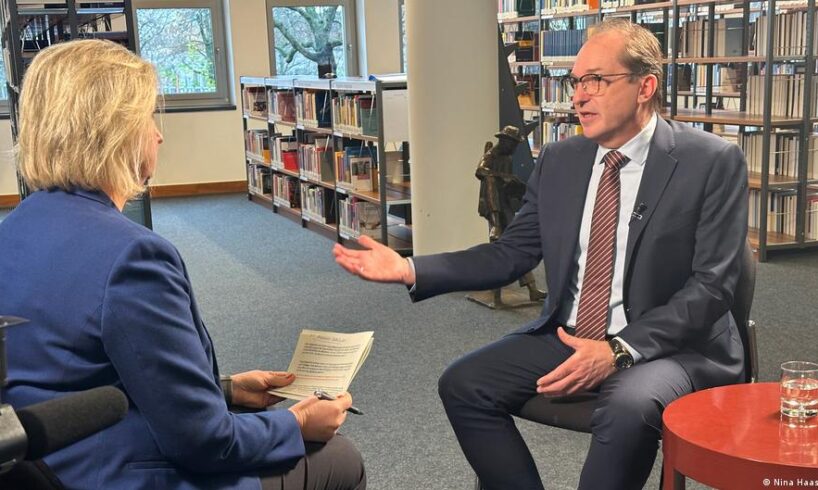
Germany’s Federal Interior Minister Alexander Dobrindt from the conservative Christian Social Union (CSU) said in an interview with Deutsche Welle that he had not overpromised when he announced stricter migration policies upon assuming office.
“My course is very tough, and that’s exactly how it’s been perceived,” he told DW, adding that “from day one, we took the the decisions needed to make sure that border controls are tightened , people are turned away, and family reunifications are suspended.”
In turn, Dobrindt considers the 60% drop in the number of initial asylum applications in Germany to be “clear evidence that illegal migration is declining significantly.”
Irregular or undocumented migration refers to the movement of people across borders to take up residency without the appropriate paperwork. Critics call the term “illegal migration” dehumanizing and misleading.
‘Trigger point for radical parties’
Interior Minister Dobrindt added that migration had been “the largest trigger point for radical parties for many, many years.”
While he maintained that politics had already shifted in the matter, he also said “there is a time lag between understanding that politics is making a U-turn on migration, and the emotional experience [of it] in one’s inner circle.”
So far, the far-right party Alternative für Deutschland (AfD) which is in parts right-wing extremist, has been steadily gaining more ground in polls, despite what he’s called the government U-turn on migration policy.
The governing coalition is comprised of the conservative Christian Democratic Union (CDU), its sister party the Christian Social Union (CSU) and the center-left Social Democrats (SPD).
Meanwhile, migration experts attribute the decline in the rate of asylum seekers to more than stricter German border controls. The end of the civil war in Syria and tighter controls on the Balkan route from Greece to Austria have also led to falling numbers, as the migration researcher Birgit Glorius from Chemnitz University of Technology told the German public broadcaster Tagesschau.
DW’s head of current politics Rosalia Romaniec interviewed Germany’s Interior Minister Alexander DobrindtImage: Nina Haase/DW
Right to asylum remains in place
Interior Minister Dobrindt also implied he would not restrict the individual right to asylum. “We have an individual right to asylum,” he said in the interview, “I don’t question that, but I do question the abuse of it.”
He added that “We have to combat this to the best of our abilities.”
Dobrindt also said he wanted to see more movement at the European level in slowing migration and redistributing migrants across the bloc. One of the goals of the EU Migration Pact, which is set to take effect next year, is to make the distribution of refugees within the EU more equitable. Germany is urging countries of first entry to be more consistent in processing asylum seekers and not allowing them to travel onward.
“However, returning people to these countries of first entry is often difficult, and this must be made possible,” Dobrindt told DW.
Germany’s migration debate: What the parties want
To view this video please enable JavaScript, and consider upgrading to a web browser that supports HTML5 video
Together with other EU member states, Germany’s interior minister wants to look for a partner country in Africa to set up so-called “return hubs.” These refer to areas to which rejected asylum seekers can be deported, even if they do not originate from that country.
“There are a number of countries currently discussing whether they want to take this on together, and with which partner country they’d do it,” the minister said. “But we will definitely need a partner country from the African continent.”
Previous attempts to outsource asylum procedures from Italy to the non-EU country of Albania failed, in part due to legal hurdles and high costs. The UK government has also suspended its attempts to deport asylum seekers to Rwanda.
German Interior Minister Alexander (left) considers Poland no threat to GermanyImage: Ints Kalnins/REUTERS
Fewer Afghan nationals accepted
Part of the new government’s plan to curb migration to Germany is to terminate its special admission program for Afghans who worked with German agencies or forces during their missions in Afghanistan.
Interior Minister Dobrindt indicated that by the end of the year, all Afghan nationals who have a “legally binding admission commitment” would be brought to Germany. Most of the estimated 2,000 people who are currently eligible are waiting in Pakistan to leave.
Afghans hide in Pakistan as they wait for German visas
To view this video please enable JavaScript, and consider upgrading to a web browser that supports HTML5 video
So far, Dobrindt has only allowed people to relocate to Germany who have sued for admission before administrative courts. “It’s a problem we’ve inherited,” the interior minister said shifting responsibility to the previous coalition of Social Democrats, Greens, and Liberals. “It’s an old burden we inherited from the previous government.”
Germany’s former government had promised protection to people who had worked for German institutions in Afghanistan or who were at risk of persecution by the Taliban. Dobrindt said he was reviewing these cases “in accordance with law and order.”
One of the goals of the EU Migration Pact for 2026 is to make the distribution of refugees in the European Union more equitableImage: Philipp Guelland/AFP
Russia as a potential threat to Germany
The German interior minister also didn’t rule out that Russia and other foreign powers were attempting to destabilize Germany. In addition to attacks on data cables in the Baltic Sea and the threat posed by drones sighted at airports, Dobrindt also mentioned cyberattacks. He suggested that some originated in parts from Russia, and warned that they could become more frequent.
“I assume that in the coming months we will have to expect an increased number of cyberattacks, as well as more drone sightings and hybrid threats overall,” Dobrindt told DW.
He also called a recent controversial statement by Tino Chrupalla, co-chair of the AfD, suggesting that the NATO ally Poland could pose a threat to Germany, “complete nonsense.” He added that, “I think that’s outrageous, and honestly, I think it’s quite sickening to try to infuse such stupid sentiments into society.”
In a talk show, Chrupalla had said that he currently saw no danger to Germany from Russia, but that any country could become a danger to Germany. When asked whether he also meant Luxembourg, Poland, or Finland, for example, the AfD co-chair said “of course, Poland can also be a danger to us.”
Don’t ban the AfD, but ‘govern it out’
The interior minister turned down the prospect of initiating proceedings to ban the AfD. “I have always made clear that it is the responsibility of politics to govern the AfD out of existence, not to ban it,” he stated.
He attributed the AfD’s steady rise in popularity to polarization within German society. Dobrindt argued that this must be countered with a change in policy, not with party bans.
According to the most recent political opinion poll Deutschlandtrend by Germany’s public broadcaster ARD, the CDU/CSU only holds one percentage point more approval than the AfD, which says it wants to halt migration entirely.
Irregular migration ‘a trigger point for radical parties’
To view this video please enable JavaScript, and consider upgrading to a web browser that supports HTML5 video
This article was originally published in German.





